Arsenal in Crisis?
On Crisis
Firstly – let me say that crisis in and of itself is not a bad thing. Things fall apart all the time; Chaos is the natural order of our Universe. The word itself comes from the Greek word krisis (to decide).
The Oxford dictionary defines crisis as:
- A time of intense difficulty or danger
- A time when an important decision has to be made
- The turning point in a disease when an important change takes place, indicating either recovery or death.
You may have thought it meant something entirely different, involving words such as panic, chaos and failure… I know I did.
The legendary Leonard Cohen, who spent a large part of his life practicing as a Zen monk, said
“Everything has a crack in it. That’s how the light gets in.”
All meaningful growth is accompanied by a certain amount of pain and suffering. A motivational meme adorns office posters across the Western world: that the Chinese word for crisis and opportunity are the same. Whilst not true, there is a possible reason for its proliferation: that it has inadvertently struck upon a universal fundament – that times of immense difficulty present the occasion to basically adapt, or die.
Crisis is common. It is a natural state of existence. We cruise along the same comfortable path until we are challenged by an obstacle. Then we either resist (and struggle), flee (to face it again at a later date), or adapt (by changing direction, or incorporating the obstacle and transforming ourselves).
Take a look around you: there are people, businesses, even entire countries in crisis. One might even go as far as to say that crisis is actually normal.
The central tenet of Buddhism is that we crave things that are impermanent. This craving keeps us stuck in a cycle of death and rebirth (samsara), filled with suffering (dukkha), until we end the craving, breaking the cycle, and attaining enlightenment (nirvana).
So: in essence – according to Buddhists – this life IS suffering. Crisis is normal. It’s how we react to crisis that is paramount.

Considering the above, I don’t think it is hard to see how Arsenal Football Club could be viewed as being in crisis. In fact – the state of our club right now is almost the definition of crisis.
We are going through a time of intense difficulty. 6th in the league and more likely to drop places than gain them. Knocked out of the FA Cup in the first defence of our title – by a Championship side. Comprehensively out-played and humbled in the League Cup by a Manchester City team that is playing the kind of football that Arsenal was known for. Resting our hopes on a return to the Champions League by winning a European Cup without our record-signing striker, and our second-string record-signing striker in poor form when he isn’t injured.
There is a strong danger that we may not even qualify for European football at all next year – hardly a position to be in when the squad is in desperate need of a major overhaul, and key players are yet to recommit to the club.
It is certainly time when an important decision is to be made. Our businessman owner may not have had an issue with our permormances and results over the past decade – the money was rolling in, the brand was growing, and an FA Cup here or there gave some palliative comfort to the disgrunted fanbase. However – everything changed last year. We dropped out of the Champions League and its riches, and were supposed to use this season to focus on winning the ultimate prize: the Premier League.
There has been a growing uneasiness the past few years among those associated with Arsenal – a slow realization that perhaps it wasn’t the lack of funds that was keeping us from competing with the ‘big-money’ clubs, and Europe’s elite. The funds became available, we spent the money, we brought in top-top signings, and yet the humiliations have continued. Arsenal has lost to giants and minnows – home and away – playing stagnant, unimaginative and un-Wenger-like football.
The Wenger Out Brigade, once a thorn in the side of the Gooner fanbase, has now become its biggest faction, leaving an Arséne Knows Best camp that seems stuck in the past, fearful of change, and unable (or unwilling) to see that there is something rotten in the state of Arsenal. “Wenger Out” has become a meme, propagated to a global fanbase by the Premier League’s huge reach, and bolstered by the meteoric rise of the toxic, anti-Wenger Arsenal Fan TV.
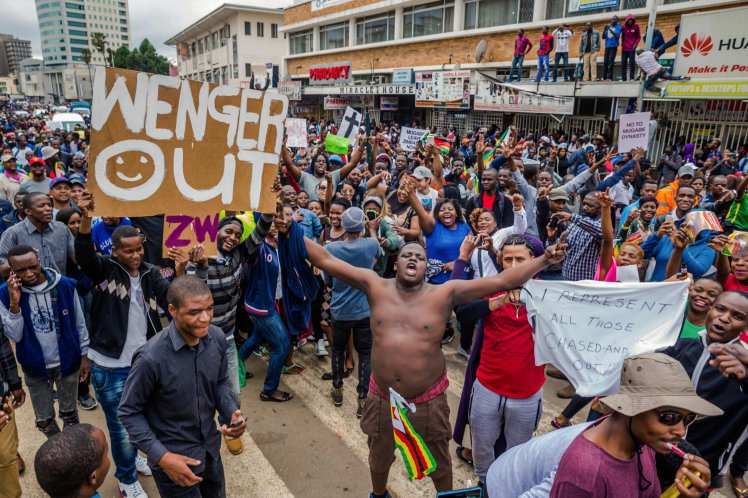
Yes. Arsenal is in crisis. This is plain to see.
In the next section I will be looking at how we came to this point, by turning my untrained eye on the man at the centre of it all.
The Manager
In Arséne Wenger we have a brilliant manager, who has, in his long tenure, helped Arsenal become one of the world’s most successful global brands. He steered the Club through a period of great turmoil, guiding it through a period of growth and suffering with a calm and steady hand. His business acumen – based on values of thrift and self-reliance, in a time when rampant spending elsewhere was transforming the face of Football – meant that Arsenal was punching well above its financial weight, allowing us to remain competitive while we secured our future.
As far as football is concerned -as a game as opposed to a business – it may be fair to say that Wenger’s ‘revolutionary’ contributions (training, diet, philosophy, acquisition, player management etc.) have been to everything except the game itself, as played on a pitch, by eleven players.
I’m heading into dangerous territory here, I know, because all of those contributions were vital in getting the best out of our players (and our budget) – which inevitably meant that on-pitch performance improved, and results followed.

Grace personified
I still maintain that Wenger’s principal tactical tool is “freedom of expression”. As someone who believes that football is an art form, I believe that this fundamental belief drives him in all of his tactical decisions. Week-in, week-out, his matchday selections include players who appear balletic, graceful on the ball – expressing themselves beautifully (Ozil, Bellerin, Iwobi) – but not necessarily (in footballistic terms) delivering end-product. He also seems to “fall out of love” with players who are more utilitarian: less flashy, perhaps, who nevertheless appear to perform the role they have been assigned (Podolski, Campbell, Perez).
Wenger inherited a solid defensive personnel, the base upon which he was able to build an Invincible squad. Along the way he collected footballers with style and grace, who occasionally also had grit and gumption. But his addiction to form over function meant that he didn’t replace the foundation on which his Wengerball was built, and the backbone of his beautiful creature started to weaken.
This unnatural selection created a shallow gene pool, and a team that is much like a thoroughbred: although capable of explosive performance, it is prone to injury. Wenger took a fat cat, put it on diet and turned it into a lion. But since then, his penchant for a certain type of player resulted in inbreeding. The lion became a cheetah: brilliant and graceful, lethal over short distances, but no competition in a world that has incorporated all of his off-the-pitch innovations, while producing a more-varied player pool.
It’s difficult to assess what Wenger’s strongest point is, as a coach, since he has pretty much been a one-club Manager. With other great coaches, we have had the luxury of seeing them perform and transform under different circumstances: with new personnel and resources, at other clubs or national teams. The Arsenal world is like North Korea: protected, cocooned, secretive. Furtive even.
No more so than in the change-room (sacrosanct in every club, I know) where it would probably be most enlightening to be a fly-on-the-wall. Wenger is notoriously difficult to second-guess. His starting line-ups, his formations, his substitutions – sometimes they boggle the amateur observer and experts alike. There are games where it seems glaringly obvious that the team is malfunctioning: Wenger seems to rely on its ability to self-correct, and no managerial input seems forthcoming. Oftentimes results have proved that this (obstinate) faith in his players is misguided.
When things go wrong on our pitch, they go horribly wrong.
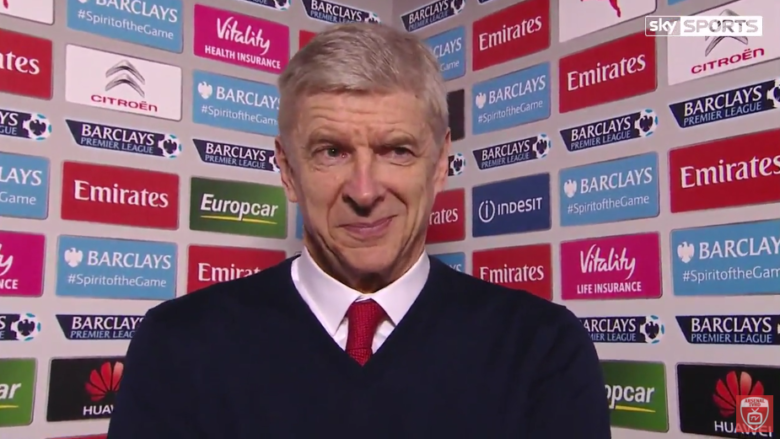
One area in which Wenger’s consistency is guaranteed is his coy evasion when interviewed. He has developed a frustrating lexicon of memes that he uses to answer even the most pertinent question: answering it without ever actually answering IT. To hijack the old Churchillian trope: Wenger is a riddle, wrapped in an mystery, wrapped in a mystery, inside an enigma.
An undeniably smart man – it would be impossible to envision what he created without being supremely intelligent – his mastery of languages and his degree in Economics are well-documented. By all accounts, he is also deeply caring: a real people person. He is not known to use the hard-nosed “hairdryer management” style of more traditional managers such as his predecessor, George Graham. From the wealth of literature I have read, it seems his natural approach is more avuncular, kind. He has a wicked sense of humour, is Inspector Clouseau-ish in his clumsiness, and has created an environment at the Club that has been described as cosy, comfortable.
It’s no wonder that players want to work with him. Footballers have become like supermodels; the money thrown at them, the celebrity status, the outlandish salaries – they have created a breed of precious, narcissistic, egotists. It is not wholly their faults – so much of a Club’s power is derived from its image management; footballers are its mannequins: contantly being dressed and ordered to preen, to help spread the brand.
As performance thoroughbreds, multi-million pound assets, they are treated with kid gloves, pampered and indulged by the Club’s employees. Traditionally it is the role of The Gaffer to assume the whip, while everyone else presents the carrot. In Arsenal’s case, however, there doesn’t seem to be a whip.
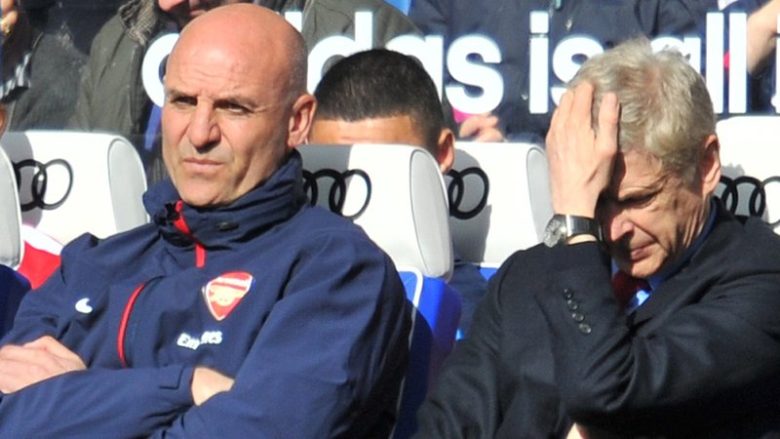
It has long been suspected that the Assistant Manager position is nothing much more than glorified cone-placer. With no offence to Steve Bould (or Pat Rice before him) – both are Arsenal legends in their own right – one has only to look at the stony remoteness on Bould’s face as he chews an imaginary piece of grass alongside Wenger, pitchside on Matchdays. He barely says anything, never gets animated, hardly looks at Wenger as things on the pitch fall apart… Phoning it in? Who knows. A million a year to be a yes-man and watch football doesn’t seem shoddy compensation.
Until recently, the CEO, Ivan Gazidis, a Wenger-approved appointee, seemed little more than a figurehead, someone to take care of all the non-footballing stuff that Arséne no longer had the time (or energy) to do himself. Traditionally, Gazidis would have a had a whip of his own, and the right to use it on a failing manager. However, the peculiar chain of command at the Club reduced him to little more than a side-kick – someone who’d announce new kits, sponsorship deals, and deflect away from the owner, Stan Kroenke.
Recent developments have seen Arsenal reshuffle the cabinet, as it were. A Director of Football (in everything but name) has been brought in, from Spanish Superclub Barcelona; a Chief Scout has been appointed, stolen from Borussia Dortmund; and a new negotiator has been hired, to perhaps give Arsenal some teeth they have been missing in the making of transfer deals.

Chief Whip? Josh Kroenke with Gazidis and Sir Chips
There is talk of Kroenke’s son, Josh, stepping up to a more active role on the Arsenal Board – perhaps signifying a growing concern by the owner over the state of his investment.
Who knows – maybe the whips are coming out, and Wenger’s long leash is being replaced by a choke chain.
One thing for sure is that Wenger is unlikely to resign: Arsenal is his entire life, his raison d’être. He is a man of unquestionable loyalty, to those above and below him; he is an honourable man, classy. He has said on numerous occasions that he will not ever break his contract – in fact, of late, he has taken to reminding us that he had many significant offers from Europe’s top clubs, trying to lure him away from his beloved Arsenal.
As pressure mounted during the 2016/17 season – it seemed touch-and-go whether he would sign the new 2-year contract on offer to him. The fact that the ball was in his court is significant – it only proves what most suspected: that the only person who could prise Arséne Wenger from Arsenal Football Club was the man himself. In retrospect he should have left then, on a high, having recently become the FA Cup’s most successful manager, bringing Arsenal its 13th FA Cup, and its 3rd in 4 years.
He would have had a sendoff, a parade, a statue outside Ashburton Grove. He would have remained a legend. This year he could have eased into an ambassadorial role, kept his ties with the Club he undoubtedly adores.
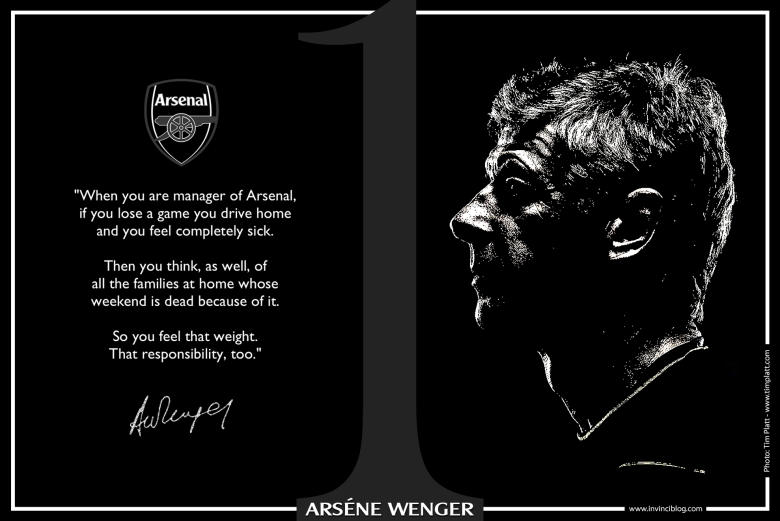
Hindsight is 20/20 though, as they say. For whatever reason, be it stubbornness, arrogance, or a sincere belief that he still had some magic in his hat, Wenger decided to stay. When the Emperor has no clothes a bad situation rapidly becomes worse, the unraveling speeds up and the cancer spreads uncontrollably.
So it was with Arsenal in 2017/18: our star players refused to sign new contracts; we failed to bring in our pre-season transfer targets, through a mixture of poor planning and outright incompetence; our performances on the pitch deteriorated – they seemed lacklustre, spineless, aimless; we sold our three main goal-scorers in the January window (Giroud, Sanchez and Walcott), and one of our promising young stars (Oxlade-Chamberlain) to direct rivals. Sure – we acquired two decent players (Aubameyang and Mkhitaryan), but once again – like the signings of Özil and Sanchez – they seemed fortuitous and accidental. Born out of desperation, a last-ditch attempt to staunch the bleeding.
And all the while, Wenger trots out his memes, digs in his heels, comes to work and puts in a massive shift – remaining ever avuncular, classy, and loyal, while the Club quietly collapses around him.
Crisis?
You decide.
If you enjoyed this article, you may enjoy my March 2016 ‘portrait’ of Wenger.
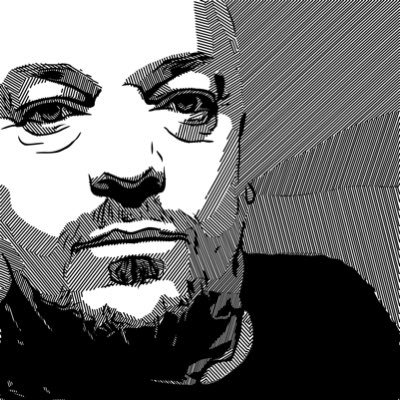
I was eleven-and-a-half. My family had just emigrated from Rhodesia to South Africa. All the kids on my street supported United or Liverpool, because of their Southern African goalkeeper connections: Bailey for United and Grobbelaar for ‘Pool. Problem was: I didn’t like the colour red – so when FA Cup Final day came around in 1979, I supported the team in yellow, even though their name sounded like “Asshole”. At the final whistle, I had bragging rights and a team that had won my heart.
Then I discovered that the Gunners also wore red. Luckily, I remained loyal, and the Arsenal has kicked my heart around ever since… (apart from a few lost years in the ’90s and early ’00s, when I was busy doing grownup things as a composer in Hollywood).
Abandoned invinciblog.com to launch this site with 1 Nil Down 2 One Up blogfather Dave Seager – and we have used this platform to help launch the writing careers of a number of amazing Arsenal bloggers.



If ever I want to tell someone in eminently indisputable truths, that his usefulness is over, I will contact you. This is such a beautiful and gentle way to present the grounds of the swell of opinion from the fans against Wenger. You have acknowledged all of his attributes and achievements whilst gently leading us into the progressive deterioration of his abilities.
Undoubtedly he is fiercely loyal and equally, many of his followers are just as loyal to him. That is another problem because it is difficult on the one hand to praise loyalty as a virtue and then try to convince people that their loyalty whilst admirable in one sense, is sadly misplaced and counter-productive.
Rather than stand on the sidelines and watch the rabid hostility from certain quarters attempt to devour the AKB brigade, I would prefer to try to persuade those supporters who steadfastly follow Wenger, that their loyalty is simply assisting in the demise of the club they support.
You have a much better command of words than I do, and I hope that you can get this message across. I believe that the first step back to our proper place is for Arsene to leave. A new manager should be left to decide where the next steps lead.
Thanks for that kind comment, Victor. Thanks also for your continued engagement and feedback on this forum. It’s greatly appreciated.
I simply love the picture.
Crisis is one of the best Supertramp albums, absolutely love it.
A crisis in Arsenal ?
Without any doubt.
Best thing would be to throw in a new manager BEFORE the Milan games.
And I mean ANY manager.
That would be the only way for us to get passed to the next round of Europa League.
The players needs a new voice.
Pronto.
Please.